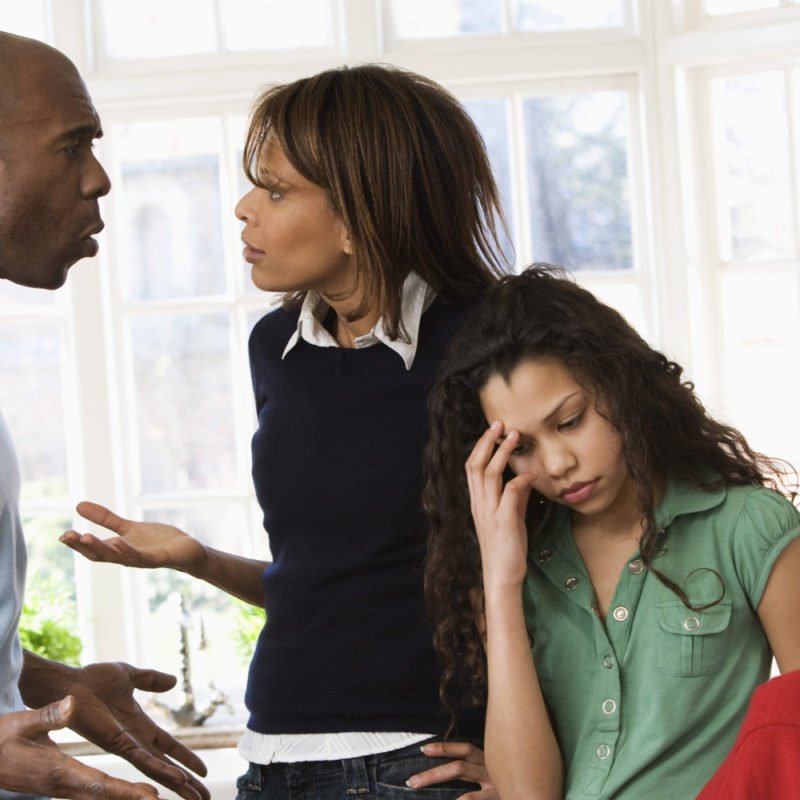When Parents Fight
“I am so heartbroken and confused. My wife wants a divorce, and in truth I think she is right that it is the best move. We fight a lot and do not have any emotional connection. It’s been this way for a long time. We have been co-existing since our second child was born five years ago. Although I’m accepting of the end of the relationship, I am so scared that our kids are going to be emotionally damaged by the divorce. I know they are also damaged by our fighting (our oldest daughter will cry and not sleep after we have a fight), but I am so afraid of all the consequences and unknowns that come with separating, co-parenting, and step-families. Is it worth staying in a bad relationship in order to not hurt the kids?”
SHE SAYS
Short answer, it is more harmful for your children to grow up in a stress-filled environment that models that normal love relationships are distant and full of tension and anger. Don’t get me wrong, staying together is always preferred over separating and putting kids in the situation of having to split their time with their parents. Especially when you consider the complications that can arise when the separation is bitter, when there are custody battles, step-families, or poor communication between bio-parents. But as with everything, parents have a choice on how they behave during and after a divorce, and the emotional stability of the child depends mostly, if not completely, on that factor.
As a therapist that specializes in relationships and work with couples, I find myself having this conversation often. Parents’ first fear at the thought of separation is usually about the effect this will have on the kids. Taken to the extreme, parents fear that their child is destined to suffer severe emotional trauma if the couple separates. These fears go contrary to recent studies on divorce that find the damage done to the young developing brain of a child living in a stressed environment far outweighs any damage done by separation of biological parents. Of course, there are contributing factors including the child’s temperament and resilience, the parents’ relationship, and the parents’ relationship with their child.
If you feel that you have really tried everything to fix your marriage (yes, including couples therapy), and you are still not able to live together and create a loving environment, separating is certainly the right choice. That being said, it is difficult to go from a combative marriage to harmonious co-parenting. Please, separate with love. When you decide to separate, put your child’s needs before your own. You must learn to work together and to not involve your child in your personal struggles any more. If you need to, seek help in order to learn how to co-parent. Kids are fairly simple; they need to feel loved unconditionally by those that are supposed to love and protect them. If you can do that, you will have happy, healthy kids- regardless of your marital status.
HE SAYS
Staying in the relationship may not be a choice. It sounds like your wife wants a divorce and that may be all we need to know. Even if staying in the relationship is a choice, it is clear that your children are being affected by the conflict in the household. This emotional damage is likely much greater than any emotional consequences of a divorce that is conducted in a thoughtful and civil manner. At this point, your children are being raised by the example of your relationship and they will go into their future relationships with the understanding that marriages are defined by routine conflict. The best thing you can do for your kids right now is show them an example of you and your wife working together to separate amicably and set up systems to co-parent with minimal conflict. Often, the effort that couples put into trying to salvage a dead relationship with marriage counseling can be better spent having a therapist work with them to figure out their post-marriage relationship. This sounds like the direction you should go.
HE SAID, SHE SAID
Disclaimer: This blog and the information herein are for educational and informational purposes only. It is not meant as a substitute for professional psychological or therapeutic services. The self-help information provided by this blog are solely the opinion of the bloggers and should not be considered as a form of therapy, advice, direction, diagnosis, or treatment of any kind. Instead, the information is designed to be used in conjunction with ongoing treatment provided by a mental health professional. Use the information in this blog at your own risk. All of the information is provided “as-is,” with no warranties of any kind, express or implied.

